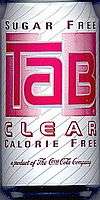Tab Clear
 | |
| Type | Diet clear cola |
|---|---|
| Manufacturer | The Coca-Cola Company |
| Country of origin | United States |
| Introduced | 1992 |
| Discontinued | 1994 |
| Related products | Crystal Pepsi, Tab |
Tab Clear was a variation of Tab. It is Coca-Cola's contribution to the short-lived "clear cola" movement during the early 1990s. It was introduced in the United States on December 14, 1992,[1] in the United Kingdom a month later[2] and in Japan in March 1993 to initially positive results. Tab Clear was, however, discontinued after only a short time of marketing in 1994. Unlike most other "clear" soft drinks, Tab Clear contained caffeine,[1] and according to the company, had the flavor of cola.[3]
Competition
After PepsiCo's introduction of Crystal Pepsi in mid-1992, Coca-Cola decided to follow suit with its own clear cola, Tab Clear, at the end of the year.[4]
In late December 1992, Coca-Cola Co. president Doug Ivester told a gathering of New York reporters that Tab Clear was being positioned as part of the "mainstream of diet soft drinks" and was "not a new-age beverage".[5] He declared:
Consumers want an alternative new soft drink with a lot of flavor. A new-age label would doom it. It would be aiming too low to go up against Crystal Pepsi and Clearly Canadian.
International introductions
Tab Clear went international only two weeks after its introduction in the United States. The clear cola with "a mouthful of flavor" was introduced at a news conference in London on January 18, 1993. The product was made available to the British public from early February that year with a trial price of 23 pence, initially in 330 ml cans and later in 1.5 and 2 litre plastic bottles. The drink was referred to as "a completely new idea in soft drinks and is unlike any other product available".[6] This made Coca-Cola the first of the two rival US soft drink global corporations (Coke and Pepsi) to launch a clear cola into Europe.[7]
In early February that year, The Coca-Cola Company announced plans to introduce Tab Clear into Japan, scheduling a public introduction for mid-March. Japan became the third country to be introduced to Tab Clear.[8]
Initial market success
After positive consumer response in its initial 10 markets, it was announced on February 17, 1993 that Tab Clear would be introduced into an additional 20 American markets the coming March, increasing the drink's availability to 35 percent of the American population.[9] In an article from the Los Angeles Times, it was reported that Coca-Cola expected to have Tab Clear available nationwide by the end of the year.[10]
Despite the positive results, an article published in March that year reported "one oddity about the new Tab Clear: it is only sold in cans. You would think that would eliminate one of the pop's strongest selling points--its clearness."[11]
Post-discontinuation
In July 2004, in an unrelated article, BBC Business News made a mention of how "colourless versions" of Coke "have not been hugely successful".[12] Some have even referred to Tab Clear's marketing as a "born to die" campaign.[13]
In his 2011 book, Killing Giants: 10 Strategies to Topple the Goliath in Your Industry, Stephen Denny published an interview with former Coca-Cola Chief Marketing Officer Sergio Zyman that stated the formation and subsequent failure of Tab Clear was a deliberate move to destroy Crystal Pepsi, capitalizing on the public's lack of understanding of Pepsi's heavily-marketed product. Tab Clear was marketed as a diet drink, which were less popular than traditional colas, and the Tab brand in general was seen as an inferior product to flagships like Coca-Cola or Pepsi. With Tab Clear being placed in such close proximity to Crystal Pepsi, the image of both brands would be damaged in what Zyman called a "kamikaze" strategy. "This is like a cola," Zyman explained, "but it doesn't have any color. It has all this great taste. And we said, 'No, Crystal Pepsi is actually a diet drink.' Even though it wasn't. Because Tab had the attributes of diet, which was its demise. That was its problem. It was perceived to be a medicinal drink. Within three or five months, Tab Clear was dead. And so was Crystal Pepsi."[14]
See also
References
- 1 2 Coke Adds a Clear Cola To Its New Age Stable. New York Times, December 15, 1992
- ↑ Tab Clear is Introduced in Britain. New York Times, January 19, 1993.
- ↑ The new beverage choice is crystal clear - Beverages April 15, 1993
- ↑ It's clear - or is it? (Coca Cola's Tab Clear) (New Products) Prepared Foods Magazine - March 01, 1993
- ↑ Coca-Cola adds clear version of Tab. (soft drink) - accessmylibrary.com Supermarket News| December 21, 1992
- ↑ THE COCA-COLA COMPANY TAKES TAB CLEAR INTERNATIONAL Great Britain First Market Outside the U.S. PR Newswire| January 18, 1993
- ↑ Coca-Cola keeps Tab on UK market. (introduction of Tab Clear) Marketing Magazine - January 21, 1993
- ↑ COCA-COLA (JAPAN) COMPANY INTRODUCES TAB CLEAR PR Newswire| February 02, 1993
- ↑ INITIAL MARKET SUCCESS PROPELS TAB CLEAR INTO 20 NEW MARKETS PR Newswire| February 17, 1993
- ↑ New Age Cola for Super Bowl Sunday - Los Angeles Times January 28, 1993
- ↑ findarticles.com - Prepared Foods
- ↑ Bananas are not the only fruit BBC NEWS / BUSINESS - 1 July 2004
- ↑ Sport marketing, Volume 13 Google Books UK
- ↑ Denny, Stephen. Killing Giants: 10 Strategies to Topple the Goliath in Your Industry. Portfolio Hardcover, 2011, p. 86-89.